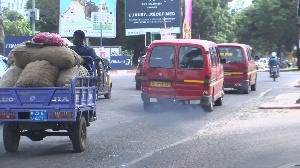- Home - News
- Elections 2024
- News Archive
- Crime & Punishment
- Politics
- Regional
- Editorial
- Health
- Ghanaians Abroad
- Tabloid
- Africa
- Religion
- Photo Archives
- Press Release
General News of Tuesday, 22 April 2025
Source: www.ghanawebbers.com
Air quality experts call for tougher action on high-polluting vehicles amid alarming death toll
Ghana's air pollution is a serious threat to public health. Experts warn that high-emitting vehicles are major contributors.
Professor Kofi Amegah from the University of Cape Coast calls for action. He suggests banning or heavily taxing these vehicles. He believes Ghana cannot ignore their role in the health crisis.
During a lecture in Accra, he stated, "We need to find a way to get rid of them." He supports heavy taxes as a deterrent and proposes vehicle replacement options for owners.
Professor Amegah criticized the now-repealed vehicle emissions levy. He said it focused on generating revenue rather than improving air quality.
Shocking data highlights the urgency of this issue. The World Health Organization reported over 28,000 deaths in Ghana due to air pollution in 2019. This number exceeds deaths from malaria, HIV, and tuberculosis combined.
That means one death every 19 minutes in Ghana. If unchecked, air pollution could kill over 2,300 people monthly. The Global State of Air Report revised this figure to 30,000 deaths annually.
Globally, air pollution caused 8.1 million deaths in 2021—22,192 daily fatalities. UNICEF reports that one child dies every minute from air pollution.
The Air Quality Life Index states polluted air reduces global life expectancy by 1.9 years. This amounts to an astonishing loss of 14.9 billion life-years.
At the public lecture titled “A Neglected Killer: Air Pollution and the Lung,” experts called for urgent interventions. Professor Amegah stressed the need for bold enforcement measures alongside policies.
He urged transitioning to clean cooking solutions and eliminating charcoal use at home. He emphasized that vehicles are causing damage on roads every second.
Professor Jane Afriyie Mensah leads the Ghana Thoracic Society's mission for public action. She noted the importance of educating people about lung health risks.
“We need to raise our voices against this menace,” she said. The society plans targeted educational activities for those most at risk from air pollution.
Desmond Appiah from the Clean Air Fund highlighted policy gaps in addressing air quality issues. He called for a clear national air quality policy as guidance for future actions.
Such a policy would ensure all projects consider their impact on air quality in Ghana.
Ghana’s toxic air is no longer invisible; it is a proven killer. Professor Amegah's message is clear: we must clean our air now or continue counting lives lost.











